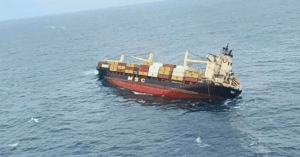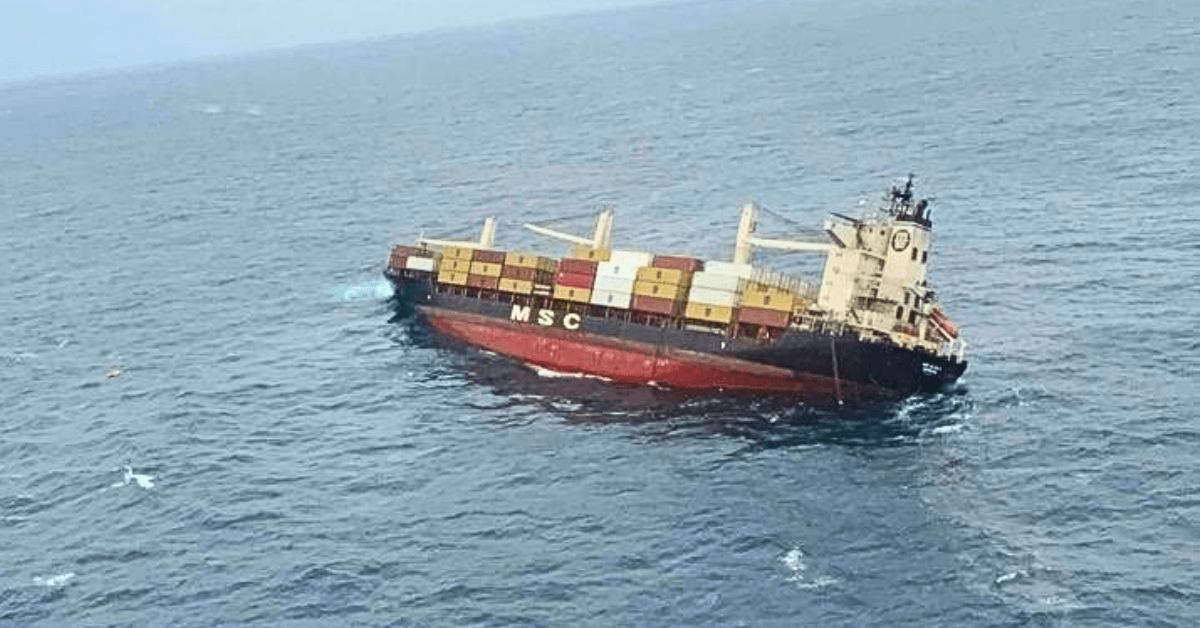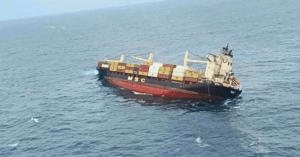
In A First, Israeli Navy Strikes Houthi-Controlled Ports After Evacuation Warning
June 10, 2025
UNESCO To Build World’s Largest Ocean Observation Network With 10,000 Ships
June 10, 2025

The underwater salvage operation of container ship MSC Elsa 3, which sank off the Kerala coast on May 25, began on June 9, under the supervision of the Directorate General of Shipping (DGS), Mumbai.
The ship sank around 13 nautical miles off Alappuzha while sailing from Vizhinjam to Kochi, leading to a large-scale offshore and shoreline response coordinated by Indian and international agencies.
The vessel’s owners, Mediterranean Shipping Company (MSC), have appointed Singapore-based T&T Salvage to carry out the underwater operations. The Diving Support Vessel (DSV) SEAMEC III has been mobilised to the site, carrying 12 divers who will conduct air-diving operations to locate and seal fuel oil tank openings to prevent oil leakage. The vessel is also equipped with Remotely Operated Vehicles (ROVs), diving gear, and decompression systems to support deep-sea diving near the wreck site.
The DGS confirmed that the first stage of the operation involves identifying and capping openings of the sunken vessel’s fuel tanks.
— Indian Coast Guard (@IndiaCoastGuard) May 24, 2025
The second stage, scheduled to start in early July, will involve removing the fuel using a hot tapping method. This stage is expected to finish by July 3, subject to weather conditions during the monsoon.
Two offshore support vessels, Nand Saarthi and Offshore Warrior, are assisting in controlling the small oil sheen visible on the sea surface. These vessels have been continuously engaged in oil dispersion activities. The Indian Coast Guard’s pollution response vessel, ICGS Samudra Prahari, is also stationed near the site, prepared to act in case of any emergency.
Additionally, the Emergency Towing Vessel (ETV) Water Lily conducted a multi-beam seabed survey at the incident site starting June 5. The initial part of the survey has been completed, and the collected data is being analysed to support the next phase of salvage work.
Authorities have confirmed that although a light oil sheen has been observed at sea, no oil pollution has been detected along the Kerala coast as of now. However, necessary oil spill response equipment has been kept ready as a precaution. Fishing activities near the wreck site remain restricted due to environmental safety concerns.
@IndiaCoastGuard #MRCC, #Mumbai received a Distress Alert regarding Liberia-flagged container vessel MSC ELSA 3 developing 26° list approx 38 nautical miles southwest of #Kochi. Vessel departed #Vizhinjam Port on 23 May 25, bound for #Kochi with ETA 24 May 25. #ICG is actively… pic.twitter.com/U7SzOBsE9h
— Indian Coast Guard (@IndiaCoastGuard) May 24, 2025
According to reports, MSC Elsa 3 was carrying 640 containers when it sank. At least 100 containers were lost overboard, and 61 washed ashore. So far, 51 of these containers have been recovered and transported to port.
The remaining 10 containers, which are partially submerged or stuck in difficult locations, are under active salvage, according to the Marine Emergency Response Centre (MERC), Gujarat, which was appointed by the MSC and the vessel’s Protection and Indemnity (P&I) Club insurer.
Officials have confirmed that none of the containers that reached the shore contained hazardous materials. However, some did carry plastic nurdles, or small plastic beads, which have now been found along the Thiruvananthapuram and Kanyakumari coasts. Clean-up operations for these nurdles are progressing steadily in close coordination with MERC, local district authorities, and the State Disaster Management Authorities.
The Kerala State Government has issued a Standard Operating Procedure (SOP) to guide the systematic deployment of trained volunteers from NGOs and Civil Defence, starting June 8.
Consequent to sinking of MSC ELSA 3 off #Alappuzha, #Kerala raising #OilSpill concerns. @IndiaCoastGuard launched swift & robust response
#ICG Ship Saksham with #PollutionResponse gear, Dornier aircraft for aerial surveillance & #OSD dispersal.
02 OPVs incl. #ICG Pollution… pic.twitter.com/djER6Q2stO— Indian Coast Guard (@IndiaCoastGuard) May 27, 2025
Meanwhile, the DGS continues to hold daily coordination meetings with stakeholders to ensure the operation remains safe, efficient, and environmentally sound. A statutory investigation into the cause of the sinking is being carried out by the Mercantile Marine Department’s Kochi unit under the Merchant Shipping Act.
According to early findings, investigators suspect a problem in the ship’s ballasting system might have led to the accident. Per reports, the vessel developed a 26-degree list before it sank rapidly.
Representatives from MSC, the P&I Club (identified by Equasis as Steamship Mutual Underwriting Association with the UK P&I Club), and the State Government have held meetings and agreed to resolve claims according to the law, while the government continues to collect evidence related to the cause and impact of the incident.
References: thehindu, newindianexpress
Source: Maritime Shipping News


